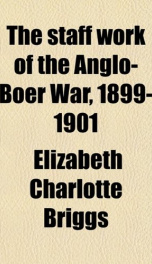the staff work of the anglo boer war 1899 1901

Purchase of this book includes free trial access to www.million-books.com where you can read more than a million books for free. This is an OCR edition with typos. Excerpt from book: CHAPTER III PRISONERS OF WAR In all former wars, after the formal declaration of peace, it has followed that the prisoners of war have been restored to the Governments to which they respectively belong. But in this conflict only one side has prisoners, and there is no question of formally announcing peace. We were, indeed, told by Lord Roberts in the December of 1900, before he embarked for England, that the war in South Africa was practically over, but he has since had to admit that he was a little premature in his statement. Indeed, the words were hardly uttered before the condition of affairs proved the very reverse to be the case. Before he arrived at the end of the voyage a period of graver anxiety for Cape Colony had set in, especially for Cape Town, than had characterised the operations during any period of the campaign. Capturing of convoys, taking of prisoners, unexpected conflicts amongst the hills, simultaneous attacks on five garrisons, raids into the vicinity of Cape Town itself, are incidents which followed each other in quick succession, and produced a feeling of anxiety that had never previously been felt in the capital of Cape Colony. A general rising of the Dutch colonists never appeared so imminent as during the first week after Lord Roberts' return. Indeed, so disappointed was he at the turn affairs had taken, that he wrote to the Mayor of Portsmouth the following letter, which in its simplicity is full of pathos : My gratitude on being thought worthy of the high honour proposed to be conferred upon me by the borough of Portsmouth is so very great that it led me to acquiesce in naming an early date to visit the town. I did so, however, contrary to the very strong feeling that it would be more suitable to postpone all public entertainments until a...
Info about the book
Author:
Series:
Unknown
ASIN:
184511020X
Rating:
3.5/5 (2)Your rating:
0/5
Languge:
English
Users who have this book
Users who want this book
What readers are saying
What do you think? Write your own comment on this book!
write a commentif you like the staff work of the anglo boer war 1899 1901 try:
Other books by this author
Do you want to exchange books? It’s EASY!
Get registered and find other users who want to give their favourite books to good hands!

